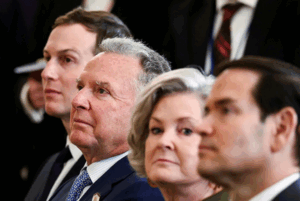Room for foot-dragging and politics: What are Netanyahu’s options for Trump’s Gaza plan?

Jared Kushner, Trump’s special Envoy Steve Witkoff, White House Chief of Staff Susie Wiles and US Secretary of State Marco Rubio at the White House, 29 September 2025
Jonathan Lis writes in Haaretz on 1 October 2025:
Though Prime Minister Benjamin Netanyahu has publicly declared his support for U.S. President Donald Trump’s plan for ending the war, people both in Israel and abroad are skeptical of his willingness to implement all its provisions.
Numerous people have described his efforts to delay and disrupt negotiations on a deal to end the war and free the hostages in the past, in part due to fears that his government would collapse. These sources have accused him of both foot-dragging and deliberate sabotage. And National Security Minister Itamar Ben-Gvir boasted in January that he personally had thwarted deals repeatedly thanks to his political power.
It’s hard to judge how committed Netanyahu is to the current plan. Government officials think that under no circumstances could he have publicly opposed Trump’s initiative at this point in time. But in his speech at the White House, Netanyahu said that Israel wouldn’t hesitate to “finish the job” of destroying Hamas in the Gaza Strip if the organization doesn’t cooperate with the agreement.
Moreover, whether for political or security reasons, Netanyahu is likely to prefer continuing the war to any arrangement that would allow Hamas’ leadership to remain in Gaza after the war ends, which Trump’s plan does.
Another problem is that the plan is very vague, giving Netanyahu plenty of room to put the spokes in the wheel during the talks on translating its principles into practical action and thereby make it difficult for the international community to end the fighting or set up an alternative government in Gaza. And he will only be helped in this effort by Qatar’s statements on Tuesday that Hamas may demand changes in the plan.
The plan leaves several major issues related to its implementation up in the air. For instance, it says that Netanyahu is supposed to announce that the war has ended and stop all offensive operations in Gaza as soon as both sides publicly confirm that they accept the plan. Hamas is then supposed to free all the Israeli hostages within 72 hours, which would be a significant achievement for Israel.
But the plan doesn’t say whether Israel would still be bound to stop the war should Hamas announce that it can’t comply because not all the living hostages are in its hands, or because it can’t locate all the dead hostages who were buried somewhere in Gaza.
Similarly, the plan clearly specifies how many Palestinian prisoners Israel will have to free in exchange for the hostages, but says nothing about who they will be. Israel could therefore oppose the release of well-known prisoners with symbolic status among the Palestinians and thereby spark a fight with Hamas on this issue.
Yet another question is whether Netanyahu will agree to swallow the frog of allowing senior Hamas officials to continue living in Gaza under the conditions set by the plan – namely, that they “commit to peaceful coexistence and to decommission their weapons.”
The plan does require Israel to carry out certain provisions even if Hamas ultimately rejects it. Under any circumstances, for instance, it will be required to transfer control of territory deemed free of terror to the technocratic government to be established in Gaza. This would pave the way for Gaza’s reconstruction and reduce the territory in which Israeli troops are present.
Nevertheless, the document contains no timetables for implementing many key provisions, nor does it list clear benchmarks for when crucial goals have been achieved.
It also doesn’t say who will decide whether Gaza has been demilitarized or whether the Palestinian Authority has implemented the requisite reforms and can therefore be allowed to run Gaza. Nor does it answer questions such as whether senior Hamas officials who choose to remain in Gaza will be allowed to own a handgun or rifle for their own protection.
What does Israel’s government think of the plan? People close to Netanyahu have already said there is no need to actively disrupt it or introduce obstructionist demands, because some of the provisions are unfeasible and will never happen in any case.
Cabinet Secretary Yossi Fuchs, for instance, said that despite what the plan says, the PA will never receive responsibility for running Gaza. Nor, despite the Americans’ intentions, will the plan ever lead to the establishment of an independent Palestinian state, he added.
“The demands in Trump’s 2020 peace plan for significant reforms” of the PA “and for American and Israeli confirmation that they have been implemented will never be fulfilled,” he posted on X. “In any case, the PA won’t control Gaza.”
“As for our absolute opposition to a Palestinian state, it remains in force,” Fuchs continued. “This plan doesn’t establish such a state, and President Trump said explicitly that he respects the prime minister’s opposition to a Palestinian state, which is also the position of the entire Israeli government.”
In contrast, he said, the plan contains a major achievement for Israel. No previous proposal since the beginning of the war, he noted, has included “the return of all the hostages at once even as the IDF continues controlling the Gaza Strip and ensuring Israel’s security.”
This article is reproduced in its entirety
